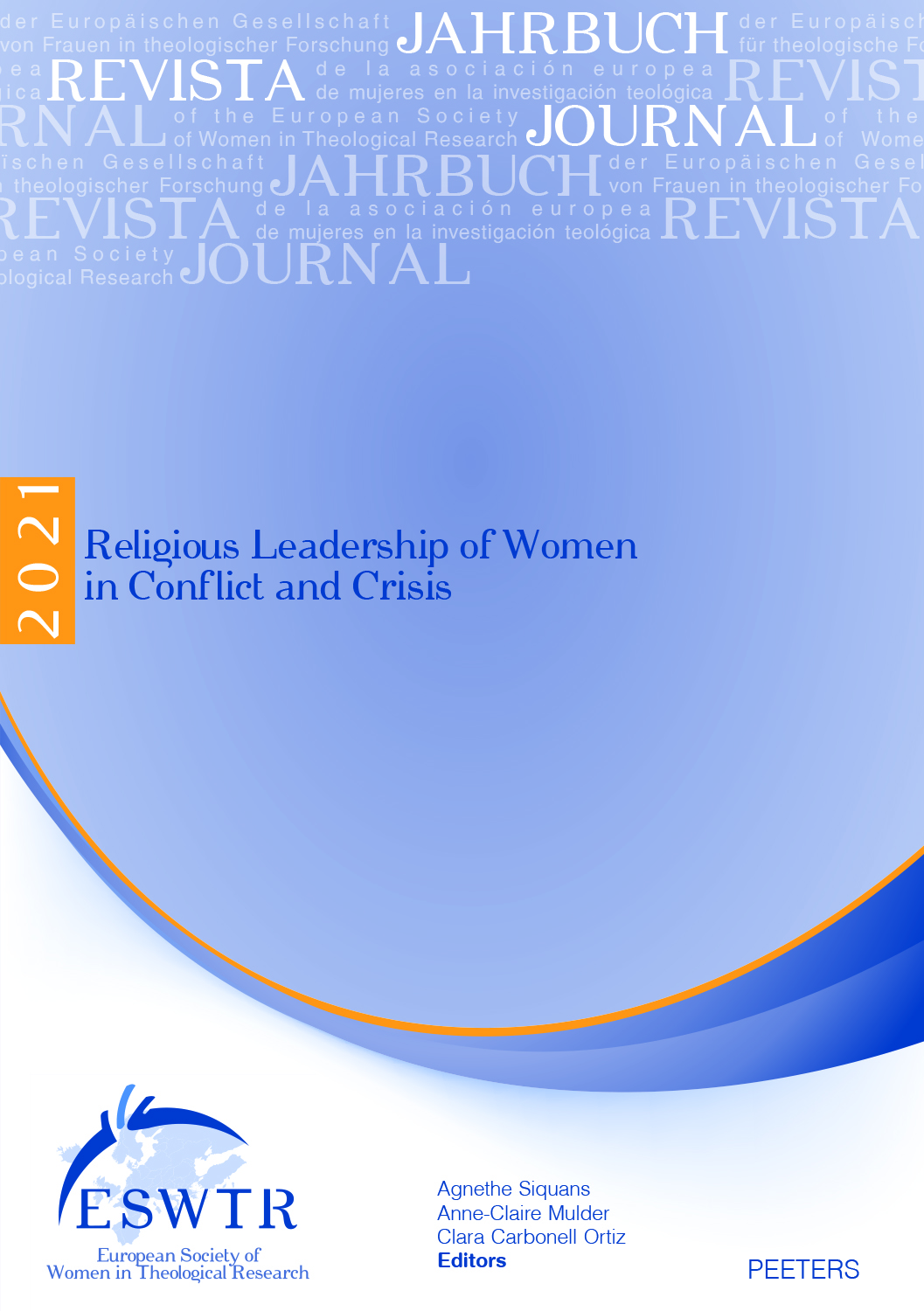 previous article in this issue previous article in this issue | next article in this issue  |

Preview first page |
Document Details : Title: ¿Errores doctrinales o pluralismo teológico? Author(s): ZUBÍA GUINEA, Marta Journal: Journal of the European Society of Women in Theological Research Volume: 21 Date: 2013 Pages: 119-132 DOI: 10.2143/ESWTR.21.0.3017279 Abstract : The Vatican’s misogynist obsession with gender and its open war against the LCWR represent the framework for the accusations against Margaret Farley and Elisabeth Johnson. Their offence: to have risen to speak in order to take part in debates which regard the faith in our current world, for which the old, traditional responses of the official church are no longer valid. Departing from an ecclesiastical fundamentalism and Tridentine ecclesiology which reduce community to uniformity and believe to own the absolute truth; from the old and pre-conciliar view that confuses magisterium with theology and the depositum fidei with the forms of its tradition, 'correct' theology with the repetition of traditional formula; from the incapacity to engage with the pluralism that shapes our faith and forgetting that the task of theology is fides quaerens intellectum, to understand the message and to find ways to express it in different times, places and cultures, they are accused of theological errors and of contradicting the teaching of the church, with poor arguments that both theologians have refuted brilliantly and convincingly. To explore new forms to believe in God and new possibilities to of faith and the commitment to Christianity in a liberating way, to discover new ways of the living presence of the Spirit and to express it in the language and categories adequate to today’s worlds, to engage with the dialogue of faith in new forms of thinking and crucial themes, to open windows of hope… This is not contradicting the faith of the church, but to situate oneself in the border areas, in the style of Jesus. Die misogyne Obsessivität des Vatikans bezüglich der Gender-Debatte und der offene Krieg gegen die LCWR sind der Rahmen für die Anschuldigungen gegen Margaret Farley und Elisabeth Johnson. Ihr Delikt: Das Wort ergriffen zu haben, um an Debatten teilzunehmen, welche den Glauben unserer aktuellen Welt betreffen, für den nicht die veralteten, traditionellen Antworten der offiziellen Kirche gelten. Ausgehend von einem kirchlichen Fundamentalismus und einer tridentinischen Ekklesiologie, die die Gemeinschaft auf Uniformität reduziert und glaubt, die absolute Wahrheit zu besitzen; vom veralteten und vorkonziliaren Gesichtspunkt, der Lehre mit Theologie verwechselt und das depositum fidei mit der Art und Weise, es zu vermitteln, 'korrekte' Theologie mit der Wiederholung traditioneller Formeln; von der Unfähigkeit, sich mit dem Pluralismus, der den Glauben prägt, auseinanderzusetzen, und vergessend, dass die Aufgabe der Theologie Fides quearens intellectum ist, die Botschaft zu erfassen und Formen zu finden, sie in unterschiedlichen Zeiten, Orten und Kulturen auszudrücken, werden sie der theologischen Irrtümer beschuldigt, und dass sie der Lehre der Kirche widersprechen, mit armseligen Argumenten, die beide Theologinnen brilliant und überzeugend zurückweisen. Neue Formen, an Gott zu glauben, und neue Möglichkeiten des Glaubens und der Bindung an das Christentums in einer Weise zu erforschen, die befreiend wirkt, neue Wege der lebendigen Präsenz des Geistes zu erkennen und sie in der Sprache und den Kategorien, die der heutigen Welt entsprechen, auszudrücken, sich mit dem Dialog des Glaubens in neuen Formen des Denkens und entscheidenden Themen auseinanderzusetzen, Fenster der Hoffnung zu öffnen … Das heißt nicht, dem Glauben der Kirche zu widersprechen, sondern sich in den Grenzbereichen zu situieren, ganz im Stile von Jesus. < La misógina obsesión vaticana por la ideología de género y la guerra abierta contra la LCWR enmarcan las encausaciones de Margaret Farley y Elizabeth Johnson. Su delito: haber tomado la palabra para participar en debates que plantea a la fe nuestro mundo actual, a quien ya no valen las obsoletas respuestas tradicionales de la Iglesia oficial. Desde un fundamentalismo eclesiástico y una eclesiología tridentina que reduce la comunión a la uniformidad, que se cree poseedora de la verdad absoluta; desde planteamientos obsoletos y preconciliares, confundiendo la doctrina con la teología, el depósito de la fe con las formas de transmitirlo, la 'correcta' teología con la repetición de las fórmulas tradicionales; desde su incapacidad de afrontar el pluralismo, connatural a la fe, y olvidando que la tarea de la teología es fides quaerens intellectum, desentrañar el Mensaje y buscar formas de expresarlo en los diferentes tiempos, lugares y culturas, les acusan de errores teológicos e ir contra la enseñanza de la Iglesia, con paupérrimos argumentos que ambas teólogas rebaten brillante y contundentemente. Explorar nuevas maneras de pensar a Dios y nuevas posibilidades de vivir la fe y el compromiso cristiano de una manera liberadora, discernir nuevos caminos de la presencia viva del Espíritu y expresarlo con lenguajes y categorías adecuadas a nuestro mundo, afrontar el diálogo de la fe con nuevas formas de pensamiento y temas cruciales, abrir ventanas de esperanza … eso, no es ir contra la fe de la Iglesia, es situarse en las fronteras, al estilo de Jesús. |
 |


